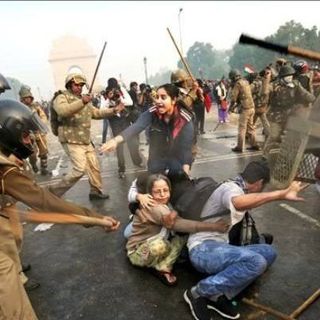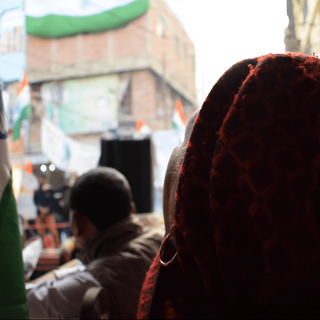The day after Women’s Day was like any other in Mexico City, with people going to work, riding the public transportation system, and buying groceries. Except, the number of women on the streets had dropped by tens of thousands overnight — leaving the city mostly empty.
On March 9, the women in Mexico City conducted a historic strike, attempting to shut down the country, in response to an increasing number of femicides (hate killings) of women. The recent and highly publicized murder, disembowelment, and skinning of a young woman by her boyfriend and the kidnapping, rape, and murder of a 7-year-old girl discovered in a plastic bag prompted the outrage and solidarity.
But gender-based violence has been on the rise in Mexico. An average of 10 women are murdered per day in the country; nearly 4,000 women total were killed in 2019 alone, mainly targeted by male relatives for their gender, the Associated Press reports. In response to such jarring numbers, women in Mexico City held a Un Dia Sin Mujeres (A Day Without Women) and boycotted workplaces, schools, supermarkets, banks, even housework. In solidarity, many multinational companies, banks, and small businesses announced they wouldn’t punish any women employees for joining the strike and not showing up to work.
The point was to demonstrate “how valuable we women are, our contribution, and what would happen if one day we were not around. In all aspects: as homemakers, as workers, as consumers,” Lluvia Flores Gómez, 40, tells the Associated Press. “The point is for there to really be a loss, that is, for this day to happen without us. … It had to be something like this, radical and cutting, so that the loss for everyone would be seen … or rather the absence, the lack of our presence.”
Related on The Swaddle:
Know Your Rights: Navigating Domestic Violence Laws in India
At an estimate, the strike cost the Mexican economy US$1.37 billion, according to national business group Concanaco Servytur, BuzzFeed reports.
The magnitude of the strike, however, did not register with the country’s president, Andrés Manuel López Obrador. He insisted his administration did not need a new strategy to combat femicides, the rates of which have risen by 7% between 2018 and 2019, according to AP. Over the past five years, femicide rates have increased by 137%, according to the country’s attorney general. In response to A Day Without Women, Obrador gave a non-answer, citing the need to decrease unemployment and prevent family disintegration to reduce violence against women. He did not acknowledge the gendered nature of the problem or provide specific solutions to counter it. Instead, he portrayed himself as the victim of a conspiracy, casting aspersions on the opposition donning “the mask of feminism” to “get rid of the government,” The Guardian reported.
While days without women, as a form of strike, have historically been planned around International Women’s Day, not many have achieved the scale of boycott attempted by the women in Mexico City. With women being integral not only to the professional sphere — they comprise 40% of the workforce in Mexico, according to the country’s Confederation of National Chambers of Commerce — but also to the running of households, A Day Without Women attempts to challenge the imagination, asking an integral question none of us dare find the answer to: What in the world would happen if women simply disappeared?




